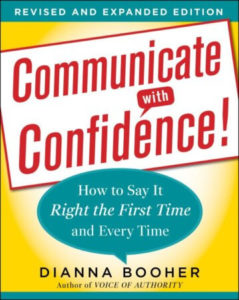


(Forbes first published my article here.)
You’ve probably heard the old joke about the socially awkward woman whose friend set her up with a blind date to attend a party. As she’s dressing for the evening, old adages from conventional wisdom start running through her mind, “Show interest; don’t talk about yourself.” “Ask questions.” “Offer genuine compliments.”
Later, when she and the blind date finally meet, she’s startled at the guy’s girth. He can hardly scrunch into the chair the host offers him at the party. Very quickly, the couple discovers that they have precious little in common. The conversation becomes more and more stilted and finally stalls.
Remembering those etiquette and communication tips her mom frequently passed along and trying to jumpstart the conversation, she finally blurted out a compliment: “You don’t sweat much for a fat person.”
At one point or another, most of us can feel socially awkward. After saying the wrong thing, we cringe and mumble on, trying to dig our way out of the conversational crater.
But staying quiet is not always the better alternative. In the workplace, you’re often compelled to respond in a potentially risky, sticky situation. If you’re baffled in difficult situations, consider the following list of comebacks:
On my first trip to Malaysia, I recall my husband’s surprise when our client-host asked over dinner: “So how many wives do you have?” Then later in the conversation, our host asked, “Do you make a lot of money and live in a large house?”
Before making the business trip, I’d read books to learn more about cultural norms—but I’d failed to mention specific do’s and don’ts to my husband. So that evening, unfortunately, I had to watch him squirm his way around and through the dinner conversation.
Although you may not be plunged into a totally different culture without adequate prep, you may still find yourself in sticky conversations at work and also with nosy family members. When asked a personal or political question that you don’t feel comfortable answering, here’s a good response (stated with a surprised, but pleasant tone of voice): “Why do you ask?”
That puts the burden on the other person to explain a legitimate reason for knowing—or to apologize for asking an inappropriate question and mumble onto another subject.
Don, a good friend of mine, adds a playful twist on the technique. Our fun-and-games conversations frequently play out like this:
Me: “Are you taking your full vacation this year? Didn’t you tell me yesterday that the company was down 15 percent?”
Don: “Why are you asking?”
Me: “Just curious.”
Don: “Are you writing a book on it?”
Me: “As a matter of fact, I am!”
Don: “Well, just leave that chapter out!”
(Of course, he knows I write books for a living. And of course, I have no intention of mentioning him and his business in any book!)
Such repartee works well between friends. But in conversations with not-so-close clients, friends, or family members, the “why do you ask” question allows you a graceful way to avoid answering personal questions.
Occasionally, you’ll find yourself in a conversation when someone starts to share gossip. Of course, you can just make an excuse to leave the conversation. But if you can’t do that—say, you’re in a business meeting—here are some alternatives that typically bring the gossip to a halt:
“Well, you can hear all kinds of rumors.” Or: “I suggest just asking Natalie if that’s the case. I feel sure she’d be glad to explain.” Or: “Details get so garbled that I wouldn’t put money on anything you hear.”
“You don’t know what you’re talking about!” “That’s not true!” “You’re wrong!” None of those statements set you up to win a “Miss or Mr. Congeniality” contest. In a conversation where others are expressing an opinion, silence often conveys consent.
So if you feel compelled to express a different opinion—but don’t want to come across as confrontational, you can try a softer approach to get your point across. Let’s say someone in a meeting recommends using a different contractor of an upcoming project because “the last job was botched.”
A soft but firm way to air your opinion might be one of these: “Hmmm. My experience with that contractor has been very different. With me, he’s always delivered on time with the promised result.” Or: “I’ve not heard any other negative comments about that contractor. Everything I’ve heard has been positive.” Or: “Your experience with that contractor surprises me. Here’s how he handled all the projects completed for me….”
In social settings and business networking, sooner or later, you’re going to feel trapped too long in a conversation that neither interests you or serves a good purpose. Yet, you can’t just say, “That’s all I’ve got,” and walk away. (Sure, that works with your teens but not with clients or colleagues.)
Instead, try these parting techniques to make your escape:
When a knee-jerk response starts to roll off your tongue, close your mouth. Think first. Your friendship or career may depend on it.
Learn more ways to handle sticky situations with Communicate With Confidence!: How to Say It Right the First Time and Every Time.
